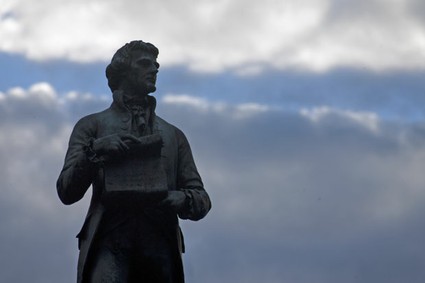
Charlottesville, Va., has become the first city in the United States to formally pass an anti-drone resolution.
The resolution, passed Monday, "calls on the United States Congress and the General Assembly of the Commonwealth of Virginia to adopt legislation prohibiting information obtained from the domestic use of drones from being introduced into a Federal or State court," and "pledges to abstain from similar uses with city-owned, leased, or borrowed drones."
The resolution passed by a 3-2 vote and was brought to the city council by activist David Swanson and the Rutherford Institute, a civil liberties group based in the city. The measure also endorses a proposed two-year moratorium on drones in Virginia.
Councilmember Dede Smith, who voted in favor of the bill, says that drones are "pretty clearly a threat to our constitutional right to privacy."
"If we don't get out ahead of it to establish some guidelines for how drones are used, they will be used in a very invasive way and we'll be left to try and pick up the pieces," she says.
The passed resolution is much less restrictive than the draft Swanson originally introduced, which would have sought to declare the city a "No Drone Zone" and would have tried to banned all drones over Charlottesville airspace "to the extent compatible with federal law." The draft would have also banned all Charlottesville municipal agencies from buying, leasing, borrowing, or testing any drones.
Councilmember Dave Norris says the city has a "long tradition of promoting civil liberties."
"It's just part of our culture here," he says.
Charlottesville is located 120 miles southwest of Washington, D.C., and has a population of about 43,000. The city is home to the University of Virginia, which has not tried to obtain a waiver to test drones from the Federal Aviation Administration.
The move earned praise from the Electronic Privacy Information Center. Amie Stepanovich, a lawyer with the group, says that the "Charlottesville resolution demonstrates that people care about protecting their civil liberties and Fourth Amendment rights and are willing to devote the time necessary to closely examine this issue."
"Lawmakers should be looking at [drone privacy] issues now in order to ensure that there are safeguards in place to protect individual privacy from these invasive technologies," she says.
Smith admits that the final legislation won't do anything to prevent federal- or state-operated drones from operating over Charlottesville's skies, but that the symbolic move could push other cities to follow suit.
"With a lot of these resolutions, although they don't have a lot of teeth to them, they can inspire other governments to pass similar measures," she says. "You can get a critical mass and then it does have influence. One doesn't do much, but a thousand of them might. We want this on [federal and state lawmakers'] radars."
Vice Mayor Kristin Szakos, who voted against the resolution, says she "can imagine ways in which drones might be used for positive things" and that the move was premature.
"I think drones have been used for bad things, but it's like banning airplanes because they can drop bombs," she says. "At this point, the city isn't even talking about using drones. It seems premature to me to ban them altogether."
Source: By Jason Koebler, U.S. News